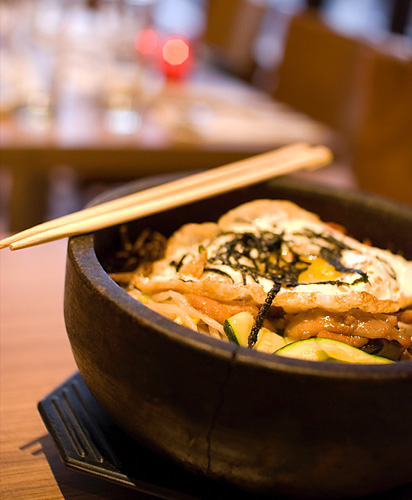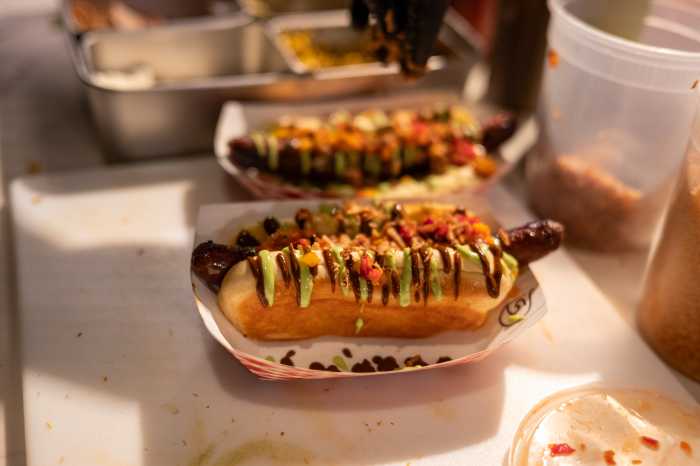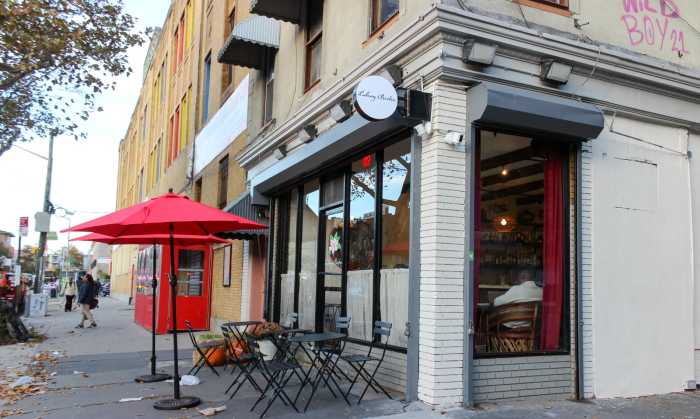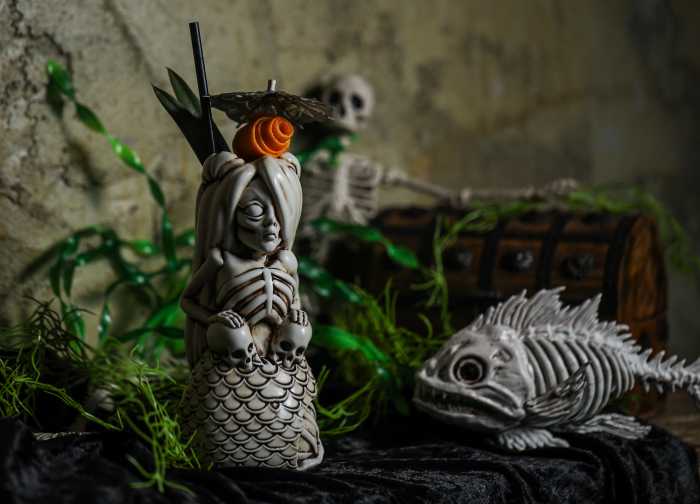Look past the giant glass windows into the modern dining room of Noo Na on Vanderbilt Avenue and you’ll know you’re entering the new age of Korean restaurants. This Prospect Heights eatery is nothing like the smoky dens of Korea Town in the garment district.
The owners of Noo Na, which opened in September, are Cathy Palm and Anatoly Dubinsky, who recognize Vanderbilt Avenue as fertile ground for new eateries. (Palm owns Le Gamin, a French bistro across the avenue from Noo Na, which is a term of endearment a Korean boy uses for his older sister. Dubinsky is the proprietor of Soda Bar, a casual bar-eatery, also on the avenue.)
The partners have fashioned a modern lounge and eatery with all the accoutrements that implies: long communal tables near the front of the large space and private tables near the back. Big red lanterns that hang above the seating cast a dark, moody glow, and in the back of the high-ceilinged room, there’s a bar where one can procure a crisp, barely sweet, strongly fruity lichee martini. Soju (like vodka made from potatoes) and a variety of sake are offered as well.
Despite the look, Noo Na has banished the Korean businessmen of Midtown Manhattan in favor of a mostly younger, hipper crowd.
But that has its upsides and downsides. On the downside, there’s the music. Club tunes play loud — not obscenely so, but strong enough so that I had to lean in to hear my friend. That may be acceptable for some diners, but I feel bullied when I’m forced to say “what?” and “excuse me?” all evening.
On the upside, there is none of the overwhelming barbeque smoke at Noo Na, where the cooking is done in the kitchen, not on grills built into the tables. And the heat of the dishes that one finds in traditional Korean establishments has been tamed for American palates. Some diners may prefer Kim’s subtler spicing, others may find the cooking lacks drama. Regardless, it’s possible to have a fine meal at the restaurant — but expect glitches along the way.
The “ban chan” changes each evening. Always available among chef Victor Kim’s three nightly offerings is “kim chee,” the highly spiced marinated cabbage that is Korea’s national dish. His version relies less on the heat of chiles and focuses more on fresh ginger and garlic to give the salad a kick.
“Pa jun” the pan-fried pancake the size of small pizza studded with mussels, and the “bin dae tuk,” mini pancakes made of mung beans, are disappointing. Both dishes are excessively greasy and bland.
It is surprising when that underwhelming prelude is followed with a stew as complexly spiced as the “soon doo boo.” The deep orange mix is served in a small iron pot, so hot that heat waves radiated from its surface. Inside the briny blend are sweet baby shrimp, squid and oysters given an intense jolt from hot red pepper. Silky squares of tofu, slices of earthy shiitake mushrooms and soft cubes of zucchini soften the pepper’s bite. This stew is supposed to cure hangovers (though that may merely be an old wives’ tale).
Served in a steaming hot stone bowl, the “dol sot bi bim bab,” a mix of delicately sweet and tender strips of pork, slices of shiitake mushrooms, daikon, slivers of crisp carrots and bean sprouts, are surrounded with a layer of rice that becomes crisp as it sits in the pot (called a “dolsot”). The dish has a mild yet not bland, vaguely sweet and sour seasoning that intensifies when it’s stirred together with a soft fried egg and some of the “gochujang,” a zesty, salty chili paste. The soft and firm textures, the brittle yet tender cubes of rice, and the sweetness of the pork make fine eating.
The barbeque, or “bul go gi,” is subtly smoky, faintly sweet and made sharp with the addition of chopped scallions and onions. The thin slices of rare beef are piled onto a lettuce leaf and smeared with a bit of the “gochujang.” You taste the cleanness of the salad and the sweet and tart combination of the soy sauce, sugar and garlic marinade.
Desserts need more love in their concept as well as execution. A ginger-infused crème brulee arrives with its sugar coating so scorched it tastes of nothing but char. And an odd strudel of sorts, filled with shredded coconut, lichee nuts, Asian pears and raisins, also sports a burnt top. The pastry, with its heavy dusting of cinnamon, reminded me more of Thanksgiving Day than anything Asian. You’re better off sticking with the offering of fine Ciao Bella ice cream and sorbet in flavors like green tea and lemongrass-coconut.
Noo Na may not sate the craving of Korean food enthusiasts, but the rest of us welcome a good martini with our bi bim bab.
Noo Na (565 Vanderbilt Ave. at Pacific Street in Prospect Heights) accepts American Express, MasterCard and Visa. The restaurant serves lunch and dinner daily. Entrees: $8-$20. Subway: C to Clinton/Washington Street. For information call (718) 398-6662.

























